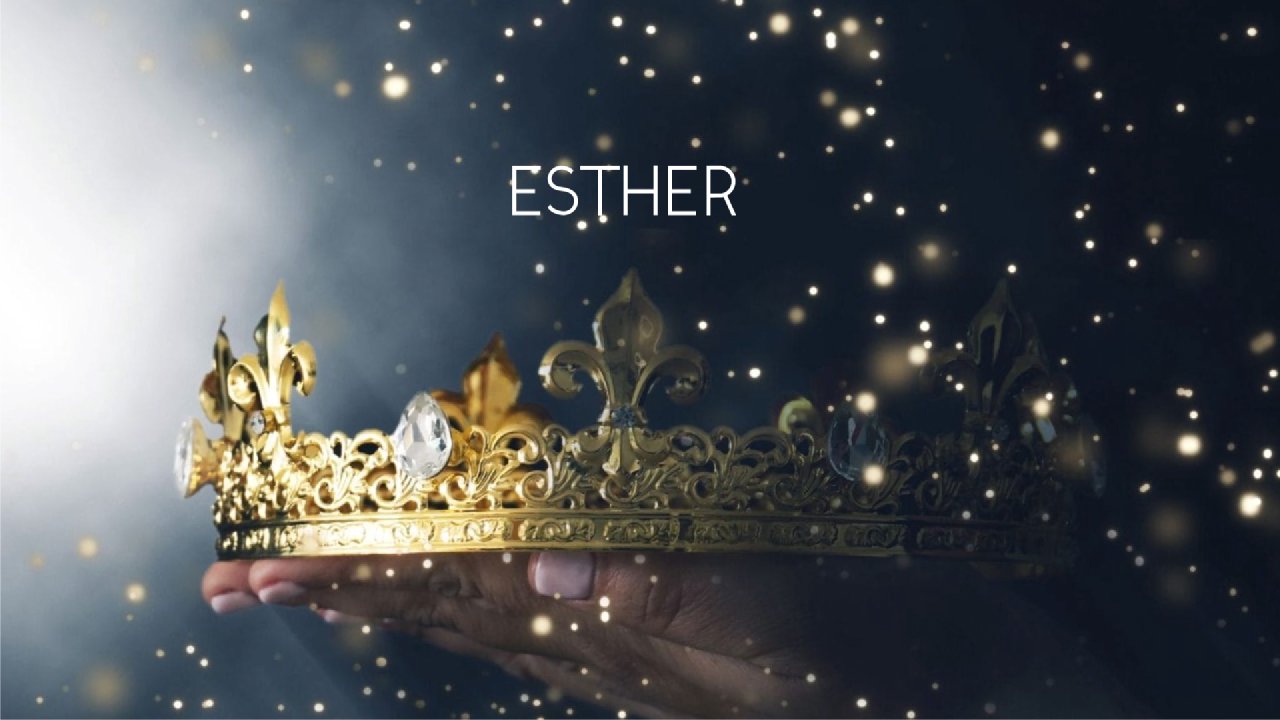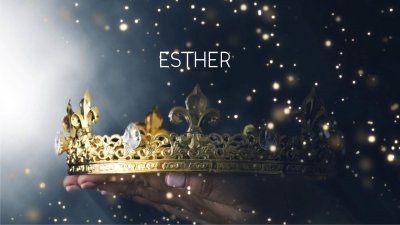• Hadassah (Esther’s Hebrew name) means “myrtle." Isaiah prophesied several hundred years earlier, “Instead of the thorn shall come up the cypress; instead of the brier shall come up the myrtle; and it shall make a name for the Lord, an everlasting sign that shall not be cut off” (Isaiah 55:13).
• Compare and contrast Daniel's life and experience in the kingdom of Babylon with Esther's in the kingdom of Persia. How are they similar? How are they different?
• Reflection: When have we been tempted to conceal our faith out of comfort or convenience, out of fear of rejection, or to avoid conflict or confrontation? What does this reveal about who's approval we are seeking?
• These were dark times in ancient Persia. Our world today, in many ways, is just as dark. Luckily, as we’ll soon discover for Esther, dark times are no obstacle for God. In fact, sometimes it’s in the darkest of times that His glory is revealed most powerfully.
• Take note of the seven references to the number seven in Esther 1:1-2:16. (Hint: 1:1, 1:5, 1:10 (2), 1:14, 2:9, 2:16.) Seven is the number used in Scripture most often to reflect the completeness or wholeness of God. God's name may not be mentioned, but there are whispers of God all over!
• Why does Esther advance over all the other girls? Take note of the repeated word "favor" in verses 9, 15, and 17. That's the big Hebrew word HESED that we find here, pointing us to God's covenantal, steadfast love. The king finding favor with her was GOD’s doing. Esther finds herself in a position of prominence because of God’s providence.
• Regardless of our disobedience, God’s hand hovers over every detail, moving the pieces into the places he’s determined. Though God may discipline us, he NEVER discards us. He works in and through and despite the sin and suffering in our lives, all for the good of those who love him and who’ve been called according to his purpose.
• God’s not seeking a perfect servant, one who can be perfectly obedient. He sent one: Jesus Christ.
• Esther was being prepared (as a bride) for the king. She spent so much time and energy undergoing beauty treatments in order to make herself acceptable for the king. What makes us beautiful before the Father? The cross of Christ. All of the ugliness of our sin and shame, nailed to that cross, so gruesome and bloody and violent… so that we could be washed clean, so that his righteousness would be imputed on US, so that we are beautiful in the Father’s eyes.
• “The gospel is not a love story in which a good-looking groom meets and falls in love with a radiant, pure bride. The gospel is a love story in which a radiant and pure groom chooses to love and purify a wretched bride who has repeatedly given herself to the devouring love of the flesh and the world… Christ took us who were spiritually ugly and gave us HIS beauty.” Landon Dowden

Week Three
September 22, 2021 • Jaime Carnaggio • Esther 2:1–18
Week Ten
November 10, 2021 • Mitzi Barber • Esther 9:1–19
• Our battles belong to the Lord, and he never loses! He never has and he never will! • Three times we are told the Jews "didn’t take the plunder.” They did only what was necessary to defend themselves, which is in line with God’s original command against the Amalakites, found in 1 Samuel 15. • Take note of the unity at the end of this passage. The Jews (and others!) were gathered together, full of joy and gladness, to rest and rejoice and feast! This battle united them! • Though invisible, God is always with us, fighting for us. Sometimes he fights alone, and sometimes he invites us to fight WITH him, like we see in Esther 9. • In what ways do we fight the battles we face today? What are our weapons, or armor? See Ephesians 6! • What is your focus when facing any battle? Your own inadequacy or God’s faithfulness, sovereignty, and power? How would it change the view of our battles if we had an eternal, God-centered perspective?
Week Nine
November 3, 2021 • Jaime Carnaggio • Esther 8
• We see a bunch of great reversals take place in this chapter. Take note of them from Esther 3:10-4:4, and also Esther 7:3-4. • Esther didn't need the house of Haman because there was something even more important to her: the deliverance of the Jews. Take note of the passion and burden she feels for the Jews, who she calls "my people... my kindred." • This upcoming "holy war" may not sit well with us, but these wars were necessary at this time in redemptive history, to preserve and protect God's people at a time when our salvation was not yet secure. From the beginning of time, God’s war has been against sin and evil… we seem to want God to destroy sin and evil but leave humanity alone, but those things don’t exist apart from humanity.” Lydia Brownback • We can rest knowing, that there will be no more holy wars in this era… not until the final holy war that comes at the end times, when God’s final judgment will fall on the wicked. And on that day of final judgment, we can rest assured knowing that a better Esther, a better mediator, someone who has pleaded our case before the King… Jesus Christ, who left the glories of heaven… fought his own personal holy war on our behalf, conquering death once for all, so that we who are rebellious sinners may have everlasting life with him. This is the Greatest Reversal to which all the reversals in Esther’s story point. [Iain Duguid] • If the people of Persia could rejoice and celebrate with "light and joy and gladness and honor," over the hope of potential victory... how much more should WE rejoice that the victory has already been won!? • Our hope is certain. We still may fight these earthly battles, but we don’t fight from a defeated position, but from a delivered one. We, too, can be full of “light and gladness and joy and honor." “You turned my lament into dancing; you removed my sackcloth and clothed me with gladness” (Psalm 30:11). “Let the people praise you, God; let all the people praise you. Let the nations rejoice and shout for joy” (Psalm 67:3-4). • So who holds the power at the end of this chapter? Who’s the hero? Not Haman. Not the king. And not even Esther or Mordecai. The LORD always has and always will hold the power. And because of that, because the LORD holds the power (and not US), we can rest assured that all is going according to plan, and we can celebrate our secure salvation in him, our guaranteed victory. Because the Lord holds the power, we can celebrate this great reversal of our eternal fate. We have "light and joy and gladness and honor" in the irrevocable and irreversible power of the Lord our God.
Week Eight
October 27, 2021 • Jaime Carnaggio • Esther 7
• In this chapter we finally see Esther make her big ask to have mercy on the Jews and revoke the decree, which was very risky because 1) The king is fickle 2) It required her to reveal her identity as a Jew 3) It would cost the king 10,000 talents 4) It was an irrevocable decree! But, as Ecclesiastes 3: 7 says, "There's a time to be silent, and a time to speak." • Take notice of Esther's choice of words in verses 13-14, not just what she chooses to say, but how she says it. It was very courageous, personal, and king-centered, and she was careful not to place any blame on the king himself (even though he was ultimately responsible!) • Consider all the ironies in this chapter: Haman, who had sought to take Esther's life, now begs that she spare his. Haman dies the humiliating death he plotted for Mordecai just 24 hours before. Haman, who wanted to kill a Jew for not falling down before him was ultimately executed on a charge of falling down inappropriately before a Jew! • Consider the interplay in this chapter between God's sovereignty and human responsibility. God's sovereignty is worked out as Esther climatically confronts the king. However, he worked out his sovereignty through her actions. She wasn’t a passive participant in his plans. She had responsibility, she had to have the resolve, the boldness, the courage to confront the king and make this big ask. • In God's economy, what is high will be humbled and what is low will be exalted. Read Luke 14: 7-11.





